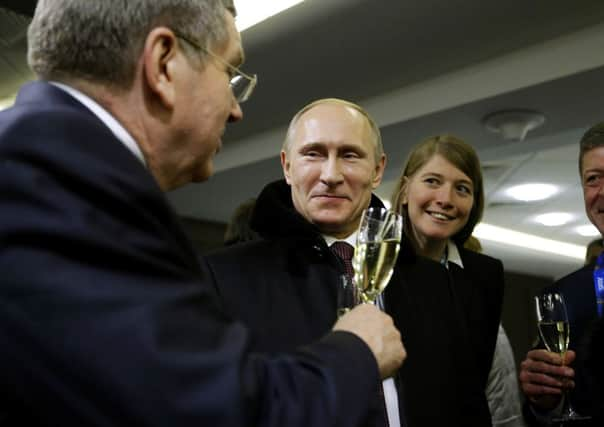Leaders: Winter Olympics | Scottish independence


The lavish opening ceremony gave him a spectacular platform which sent out the message that the Russia over which he presides is a powerful force in the world.
Of course, it would be great if the power of sport to unite peoples and nations in friendly competition, and to inspire individuals to reach the height of excellence in their chosen discipline, dominated from now to the Games’ conclusion. The Games will do that of course, but running underneath there will be all sorts of sub-currents likely to break out.
Advertisement
Hide AdAdvertisement
Hide AdOne backdrop has been the security threat posed by Islamist militants in the Caucasus region, linked to the suicide bombs in Volgograd last December. Regrettably, as was seen from the tight security at the 2012 London Olympics and which is certainly matched at Sochi, there is hardly anywhere in the world that is not exposed to that or similar threat.
But special to Russia has been the controversy over the Putin regime’s actions against homosexuals and the repression which gay people endure in Russia. This abuse of human rights has rightly drawn much condemnation. But would a boycott have been more effective?
On balance, probably not. The protests which have taken place, and the questioning which has been directed at Mr Putin and his ministers is something which they are not used to experiencing. The tolerated media in Russia is tame and that which questions him driven underground and not allowed anywhere near people of power.
The experience should have told Mr Putin, whose ambition is that Russia should be respected as a major power, that his country is not admired throughout much of the world. Enduring national strength is built not solely from military and economic might, but much more from a people who believe their human rights are respected and have the freedom to express themselves fully in all walks of life, not just on the bobsleigh runs or the ski slopes.
Whether or not an athlete expresses that in some way – and the eyes of the world’s media at the Games will be searching for the slightest expression of support for gay rights – the message to Mr Putin that because of his actions against gay rights, his country may be feared but is not respected will be as obvious as the flags being waved last night and will endure long after the Games are over. It is a message powerfully delivered.
For the moment though, let’s wish all the competitors well and for success for the Scottish and British athletes. The Games are on and there will be many thrills and much excitement to come. And in grim rain-sodden Britain, that’s something to look forward to.
Sense and sensibilities
IF SCOTTISH independence is likely to cause any major upset in the financial markets, it is over the question of what currency Scotland might use. And over that, there is a major question mark.
The Scottish Government claims that continued Scottish use of the pound is a banker bet while the UK government and the opposition Labour Party reckon it is a long-odds-against gamble.
Advertisement
Hide AdAdvertisement
Hide AdIf that wasn’t uncertain enough, leading economists have now questioned the practicality of Alex Salmond’s preferred option of a formal sterling monetary union. In such a union, Scotland would be very much the junior partner, the other being nine times her size, and bound by the kind of rules being drawn up to stabilise the eurozone monetary union.
These would involve not just limits on how much Scottish
annual borrowings and total debt would be, but also rules over its taxes and spending.
In such a union where Scotland was hit by an external shock such as, say, a prolonged slump in the price of oil, there would be very little it could do save to raise taxes and cut spending.
This might be politically unacceptable and cause investors to worry that Scotland might quit the sterling union.
The result could be ruinous capital flight from Scotland, which might also be damaging to the UK.
The best way to avert that, the economists reckon, would be for both governments to come to some agreement pre-referendum on what the currency arrangements would be.
That would make excellent economic sense. It would also help voters to decide, which is why it is unlikely to make sense to the politicians. More’s the pity.